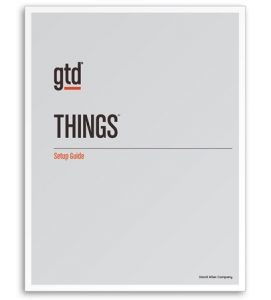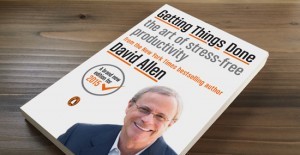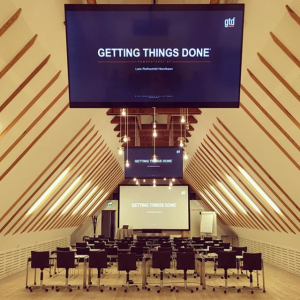David Allen's Blog, page 40
July 9, 2018
Marx’s GTD Story
 Your name
Your name
Marx Acosta-Rubio
What do you do for work?
I own several companies and coach entrepreneurs how to be successful and happy.
Where do you live?
Near Dallas, Texas.
How did you hear about GTD?
A friend recommended the book and then I hired David Allen to be my first consultant for my first company back in 2001, and I was HOOKED!
How has GTD made a difference in your work and life?
It is hard to describe what a difference GTD has made in my work and life (and aren’t they both the same?). I can tell you that I could NOT imagine my life without GTD. GTD allows me to be highly ambitious while at the same time fully relaxed, present, and moving forward in the right direction(s), while deliciously following my intuitive choices. There is a certain “smirk” that permeates most all GTD practitioners – as we have a secure sense of being able to handle anything, and not be stressed about it. Truth is, things take a lot less effort and can be done in a much faster time than people realize. After all, as David says, “There are no problems, only projects.”
What areas of GTD are you doing really well (or at least better than you used to)?
Keeping my head clear, and following my intuitive choices, is something I have focused on and can finally say, I am pretty good at it – most of the time.
What areas of GTD would you like to get even better at doing?
I would love to be able to move more quickly, and effortlessly, up and down between the levels of the Horizons of Focus. (And yes, it is a current project.)
What is one piece of advice you would give to someone just starting out with GTD?
Best advice I got, from David, and I think I would pass this along as the best piece of advice I would give to anybody wanting to start, or already doing GTD. Doing GTD 100%, is light years better and significantly different than just doing it 99%. You won’t believe how much better and incredible it is – and unfortunately, the only way to understand this advice, is to experience it.
The post Marx’s GTD Story appeared first on Getting Things Done®.
July 8, 2018
Episode #42: Getting Things Done for Teens
David Allen, Mike Williams, and Mark Wallace discuss the brand new book Getting Things Done for Teens, including what’s different, what’s the same, and some of the wisdom they’ve garnered in writing the book together. Learn more at www.gtdforteens.com.
Listen Now
Subscribe or Download
iTunes
Stitcher
Libsyn
Google Play Music
Spotify
SoundCloud
The post Episode #42: Getting Things Done for Teens appeared first on Getting Things Done®.
GTD & Things Setup Guide
We’re excited to announce the release of our new GTD Setup Guide for Things 3! We know some of you have been wanting this one for years. Here you go!

Buy the full Guide
Download a sample
The post GTD & Things Setup Guide appeared first on Getting Things Done®.
July 7, 2018
There is no “perfect” way to do GTD
 Your name:
Your name:
Jodie E Francis
What do you do for work?
I work for a federal government department as the information management lead for our branch’s national scientific collections housed in Ottawa, and we are in the process of moving our collections to a more modern facility.
Where do you live?
Ottawa, Ontario, Canada
How did you hear about GTD?
I discovered GTD almost 6 years ago when my director at the time put me on a large complex file and told me I’d better “find a system” to manage my tasks and email inbox.
How long have you been practicing GTD?
Almost 6 years. Several times, I have gone looking for a ‘simpler’ system but I keep coming back to GTD.
How has GTD made a difference in your work and life?
At work, our team is small and the work is complex. GTD helps me manage my commitments and follow up on things I am waiting for, so nothing falls through the cracks. At home, it means our children get to school, appointments and activities prepared and on time, we plan for family vacations, and attend local exhibits and festivals that strike our interest. Before GTD, the months and years just drifted past and we would miss opportunities. Although not a GTD practitioner himself, my husband is supportive, and we have consciously built a life that is in line with our higher horizon values and goals.
What areas of GTD are you doing really well (or at least better than you used to)?
Calendar management, Inbox processing, Waiting For, and Tickler.
What areas of GTD would you like to get even better at doing?
Mind Sweeps and Weekly Reviews. I still resist writing things down because I feel I will need to action it. I need to keep reviewing and culling my long lists, reminding myself that just because I have captured it, does not mean I need to ‘do it’. I regularly fall off the wagon, and it is always because I have begun to feel overwhelmed by the length of my lists and stopped doing Weekly Reviews.
What is one piece of advice you would give to someone just starting out with GTD?
Maintain a beginner’s mind. There is no “perfect” way to do GTD, just like there is no “perfect” GTD tool or “perfect” yoga practice. Start with the book, learn from experienced practitioners like those on GTD Connect, and commit to using GTD for at least a month. Then give yourself permission to begin to adapt your practice so it serves your unique needs. Oh, and do your Weekly Reviews! Really. Just do them — you will not succeed without them, and the effort is completely worth it.
The post There is no “perfect” way to do GTD appeared first on Getting Things Done®.
July 5, 2018
Are you out of your mind?
Most people are trying to manage much of their life and work in their minds, but your head is a lousy office! Recent cognitive science research has proven its limitations for remembering, reminding, and prioritizing. In this humorous TEDx talk, David Allen emphasizes the need to keep track of any and every thing that we need to be reminded of in an “external brain,” making room for more creativity, intuitive thinking, and just being present.
The post Are you out of your mind? appeared first on Getting Things Done®.
June 27, 2018
Starting with where you are, not where you should be
 Question: Why does Getting Things Done® focus on the “weeds” rather than the higher-level stuff? Why don’t we start with goals and vision and then make our way to day-to-day work?
Question: Why does Getting Things Done® focus on the “weeds” rather than the higher-level stuff? Why don’t we start with goals and vision and then make our way to day-to-day work?
David Allen: I appreciate your question. The professional and personal self-help training programs consistently emphasize higher-horizon focus—clarity of purpose, values, vision, goals, etc. I agree that such focus plays a critical role in finding alignment, balance, and perspective.
So, what’s the problem? If you’re trying to get to the beautiful lake or beach and you’re caught in the weeds, ignoring the weeds and their constraints will produce nothing but desperation and angst. You first need to know what weeds you’re in, and how to get unhooked from them. If your boat has a serious leak, you don’t care what direction it’s pointed. Relatedly, you must get control of your current situation and increase your stability and mental and emotional bandwidth in order to elevate your focus on where you think you should be going.
So if your day-to-day world is out of control in any way, trying to focus on the bigger picture will only produce frustration and guilt over not effectively doing what you feel you should be doing.
A unique aspect of GTD is that it starts with where you are, not where you should be. It’s a misconception that GTD doesn’t focus on the “Big Stuff.” GTD helps people address whatever has their attention right now so they can free up mental space to more clearly target what they want to focus on. If where you want to be five years from now is your focus, apply the GTD process: What’s your desired outcome? What’s your next action? GTD is horizon independent. The methodology helps you get clear on next actions, whether you’re clearing today’s weeds or chasing tomorrow’s dream.
I find that people often think GTD focuses on “the weeds” because that’s where they are—in the weeds. For example, when students in my courses write down what has their attention it’s never “Fulfill my destiny as a human spirit on the planet.” Yet from my point of view, that is the only project any of us really has. What people write down is, “buy cat food,” “find new babysitter,” “hire a marketing manager,” “plan summer vacation,” “fix the printer,” etc.
That said, someone once approached me during a seminar break and asked, “David, what do I do about this?” He had written down “God.” Well, that is a high-level horizon of focus! Now, he was wearing a clerical collar, so it made a little more sense. (I thought, “What a strange reversal of roles—he’s asking me!”) A bit uncomfortable with the man’s question, I put my coaching hat on and asked, “So, what has your attention about that? Is it an inspirational affirmation, or is there something you need to decide or do about whatever that means to you?” He thought for a moment, seemed to have an epiphany, and walked away inspired.
The point is whatever has your attention becomes grist for the GTD mill. GTD is about doing what you need to do to appropriately engage with life. If that’s higher horizon stuff, make sure you’ve made that operational within the GTD process. If it’s cutting weeds, GTD is the best weed cutter.
The post Starting with where you are, not where you should be appeared first on Getting Things Done®.
June 26, 2018
The principles of GTD apply to everything
 Question: Dear David Allen, Is there an adaptation of your method for writing a PhD? I find GTD helpful in life and at the job, but I have trouble adapting it to a research project. Do you have any tips?
Question: Dear David Allen, Is there an adaptation of your method for writing a PhD? I find GTD helpful in life and at the job, but I have trouble adapting it to a research project. Do you have any tips?
David Allen: The principles of GTD apply to everything, but they don’t engage with the content of what you’re doing.
What’s your desired outcome?
What’s your next action to move toward that?
Are the reminders of those in a trusted system?
That will apply to anything you’re doing in your life. No different from your research project.
The post The principles of GTD apply to everything appeared first on Getting Things Done®.
June 15, 2018
Where to find GTD Courses and Coaching
 Whether you’re new to Getting Things Done, or already have a system in place and want to gain greater mastery, you’ll get value from GTD courses and coaching services offered by our global partners around the world. For example:
Whether you’re new to Getting Things Done, or already have a system in place and want to gain greater mastery, you’ll get value from GTD courses and coaching services offered by our global partners around the world. For example:
United States and Canada – Vital Smarts (courses only)
United States and Canada – Coaching – GTD Focus (coaching only)
United Kingdom and Ireland – Next Action Associates
Belgium, The Netherlands, Luxembourg, and Dutch Caribbean Islands – Meer Effect
Germany, Austria, and Switzerland – Next Action Partners
India – Calm Achiever
Australia – Productivity First and Telus Partners
Norway, Denmark, Sweden, Finland, and Iceland – produktivNorge AS
And many more! You’ll find the full list of partners on our Global Partners page.
The post Where to find GTD Courses and Coaching appeared first on Getting Things Done®.
June 14, 2018
Control or Spontaneity? The Paradox
 When people discover the level of personal organization I work within, they often ask, “Wow, does this guy ever have any fun?! He’s so organized!” My response is usually, “Who’s not having fun?” Frankly, I organize for freedom, not for hard work.
When people discover the level of personal organization I work within, they often ask, “Wow, does this guy ever have any fun?! He’s so organized!” My response is usually, “Who’s not having fun?” Frankly, I organize for freedom, not for hard work.
Much of my personal system of organization was built and is constantly being refined by negative feedback—having to work harder than I need to, having something slip through a crack that caused inordinate pain, cost, or stress later on. Those are indicators of constriction, not freedom. When something like that shows up in my life, I’m always on the hunt for how to set up a system that will automatically prevent that kind of thing from ever happening again.
There is a freedom that is only approachable by the sacrifice of our attachments to anything, including our organization and commitments. That is the ultimate high, living without fear of consequences in the material world. (“Freedom’s just another word for nothin’ left to lose…”—Kris Kristofferson.) My ideal scene would be to trust that I could pull out my phone, and have the person I need to call appear in my mind in full detail, exactly (and only) when I needed it.
I’m not there yet. If you are, let me know how you got there. Until then, I’ll fumble along capturing my thoughts, commitments, and agreements with myself into objective, external systems, which I will review regularly, feeling absolutely fine with what I’m doing, and what I’m not doing.
People seldom complain that there is a line painted down the center of a crowded highway. Without that structure, we would likely be in constant stress going down the road, and we would not take advantage of the luxury of enjoying the beautiful scenery along the way, or thinking about what a great dinner we’re going to cook.
I do as little as I can get by with, and as much as I need, to get to the place of no distraction, a clear head, and the ability to follow my moment-to-moment intuitive hunches.
–David Allen
This essay appeared in David Allen’s Productive Living Newsletter. Subscribe for free here.
The post Control or Spontaneity? The Paradox appeared first on Getting Things Done®.
June 13, 2018
Episode #41: David Allen Talks with General Randal Fullhart
David Allen talks with General Randal Fullhart (Ret.). Graduating from the U.S. Air Force Academy in 1979, Randy has commanded at the squadron, group, and wing levels. He shares insights and tips about his own journey with GTD, teamwork, and leadership.
Listen Now
Subscribe or Download
iTunes
Stitcher
Libsyn
Google Play Music
Spotify
SoundCloud
The post Episode #41: David Allen Talks with General Randal Fullhart appeared first on Getting Things Done®.
David Allen's Blog
- David Allen's profile
- 1485 followers



